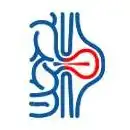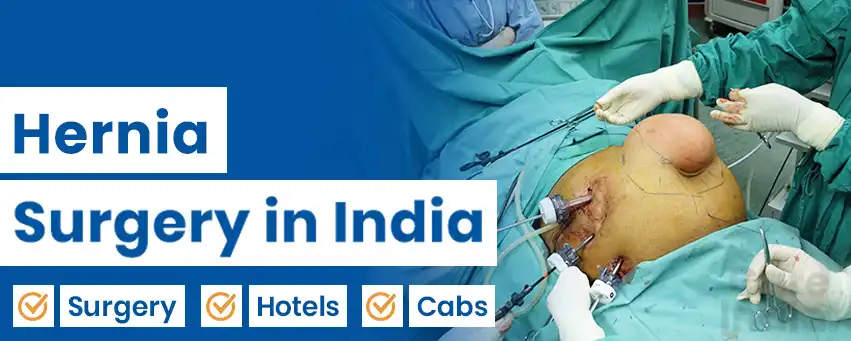

The abdomen has multiple layers of strong tissues and muscles that hold the internal organs in place. In a condition known as Hernia, a gap forms in the muscle wall due to which the internal organs protrude outwards. This happens due to weakened muscles which may make an opening/gap. There are many types of hernia but the most common is the one that occurs on the abdomen or at the groin. Hernia looks like a bulge on the skin which may stay or come and go while doing activities. The hernia cannot be cured on its own, and hernia treatment is needed to repair a hernia. In the case of large hernias, surgical procedures are required to prevent any other complications from arising.
A lot of people from African nations visit India for hernia treatment every year. Many people from Rwanda, Zambia, Uganda, and Tanzania choose India for their treatment because of its cost-effective and best medical service. Many Africans choose CureIndia's all-inclusive hernia surgery in India packages for easy and smooth medical trips in the country. Also, the visa application is easy and they do not face any problems for the same. The medical staff is very cooperative and friendly to ensure the right communication and overall satisfaction of the patient. Indian hospitals have the most experienced surgeons and are equipped with advanced medical treatment options which are used for accurate and precise treatment procedures.
There are many types of Hernia depending upon its location on the body. Based on the place of hernia, the types of hernia are discussed below:

The inguinal hernias are the most common type of hernia, which occurs on the abdomen. It occurs when there is a tear in the muscles of the abdominal wall. Due to this weak spot (tear) in the abdomen, the intestine protrudes outside the inguinal canal. The inguinal canal is at the groin area. In men, it is the area where the spermatic cord which is attached to the testicle in the scrotum passes the abdomen. In women, the inguinal canal contains a round ligament which helps in holding the uterus. This type of hernia is more common in men because the testicles move downwards from the inguinal canal after birth. It happens when the canal does not close properly and leaves a weak spot.
A diaphragm is a muscle sheet that helps in breathing and it separates the abdominal organs from the organs in the chest. When the part of a stomach protrudes into the chest through the diaphragm, it is called a hiatal hernia. This type of hernia may be a congenital birth defect and it is more common in older people over 50 years of age. The hiatal hernia mostly causes gastroesophageal reflux which means that the contents in the stomach leak back in the esophagus which causes a burning sensation in the chest.
This type of hernia occurs in babies and children. They occur when the intestine protrudes from the abdominal wall. This usually appears near the belly button. You can notice a bulge near the belly button of your child especially when they cry. This is the only hernia that goes away on its own when the abdominal muscles gain some strength. If the hernia does not go away by 5 years of your child’s age, then surgery is needed. The umbilical hernias can also occur in adults when your abdomen goes through repeated straining because of obesity, ascites, or even due to pregnancy.
The ventral hernia occurs when the tissues from the abdomen bulge from the gap in the muscles. The ventral hernias usually become smaller when you lie down. The ventral hernia may be present at birth or it may be acquired afterward in the lifetime. The factors that lead to ventral hernia are obesity, strenuous activity, and obesity. The ventral hernia can also be seen at the incision site of this hernia surgery and it is known as incisional hernia. It can occur when the muscles are weak due to the scarring from the surgery.
The other types of hernia include congenital diaphragmatic hernia, spigelian hernia, perineal hernia, epigastric hernia, etc. The hernia can be left as it is for some time if it is not creating any trouble. However, frequent monitoring is necessary as the condition may progress and cause other complications over time.
The most common and visible symptom of hernia is a lump or a bulge in the affected area. Certain types of hernia like the hiatal hernia may cause pain in the chest, heartburn, and difficulty in swallowing. You may notice a bulge that disappears when you lie down or you can touch a lump when you stand up, cough, or bend down. Most of the time there are no other symptoms than a bulge or a lump. However, when the hernia increases in size, it may get stuck in the gap and lose the blood supply. This is known as strangulation. Now that will show some symptoms like swelling at the site of strangulation, pain at the site of strangulation, vomiting and nausea, unable to pass gas or feces, etc. When these symptoms start to show, it is your signal to get the hernioplasty surgery right away.
There is no clear and exact cause of hernia. Sometimes hernia may occur due to excess straining during bowel movements, doing any activities that increase the pressure in the abdomen, or lifting heavy weights. The hernia could be present at birth but the lump/bulge may not be visible until later in life. Hernias can also be linked with heredity. Children and babies can also have hernia. The hernia in babies occurs when the abdominal wall is weak. Besides this, any activities that increase the pressure on the abdominal wall and the muscles of the abdomen can lead to a hernia. These include:

The hernia can be managed and treated by many invasive and non-invasive methods. Based on your condition, your doctor will suggest the right treatment. There are various hernia treatments options. These are mentioned below:
In many cases, the hernia can be managed and treated with non-invasive approaches. However, depending on your condition and other factors, your surgeon may recommend hernia surgery in India as the best treatment. The different approaches to treating hernia are listed below:
■ Watchful waiting: This approach is mostly used for elderly patients who may have other medical conditions. In this method, the bulge is regularly monitored at regular intervals to make sure that the bulge is not becoming larger and not causing any problems in the body. It can also be done if you have a small hernia.
■ Lifestyle changes: This method is most helpful for hiatal hernia. Making some lifestyle changes may improve the symptoms of hernia. The changes include avoiding large proportions of food at a time, sitting upright after having a meal, etc.
■ Medications: Your doctor may prescribe you some medicines that can help you get relief from the side effects of hernia such as a burning sensation in the chest, pain, etc.
■ Support garments: Sometimes, wearing a support garment known as a hernia truss can push the bulging organ back into the abdomen cavity. However, it is a short-term solution and you should not use it without your surgeon’s prescription.
■ Hernia repair surgery: Your surgeon may recommend you to surgically repair the hernia if the condition is symptomatic and there are associated risks. The main goal of the surgery is to push the protruding organ back in its place. The abdominal wall is then straightened by placing a mesh which also prevents the hernia from recurring.

Hernia surgery can be a painful condition that requires surgery for treatment. CureIndia can connect you with the leading hernia surgeons for your hernia surgery in India. General surgeons in India are highly experienced and qualified to perform hernia surgery. Let's hear from some of the most experienced hernia specialists in India.
Dr. Vicky Kuldeep is amongst the top hernia surgeons in India. He practices his treatments in Delhi, India. He is a well-known surgeon for laparoscopic surgeries for hernia, gallbladder stones, colostomy, colectomy, and surgeries for colon and rectal cancer. He has more than 9 years of experience as a general surgeon specialising in performing hernia surgery in India.

Dr. Anshuman Kaushal is a advanced laparoscopic GI, Bariatric & Laser surgeon in India. He is known as the top general surgeon in Delhi NCR. In his career, till now he has done over 15,000 surgeries globally. He has proficiency in gastric bypass surgery on a pill and is renowned as a gastric bypass surgeon in Gurgaon.

Dr. Arvind Kumar is one of the top Laparoscopic and General Surgeons in India. He provides his treatments in South Delhi, India. He has more than 22 years of experience and has treated many cancer patients. He specializes in Gastrointestinal, Bariatric, colectomy surgery, and other general laparoscopic surgeries.

Dr. Vinay Kumar Shaw is amongst the top Gastrointestinal and Bariatric surgeons in India. He practices his medicine in Gurugram, Haryana, India. He is a specialist for Hernia. Gallbladder Stone, hemorrhoids, and Fistula Surgeries. He has more than 25 years of experience and has successfully performed more than 5,000 surgeries till now.

Dr. Nikhil Narain is one of the best Proctologist, General, and Laparoscopic surgeons in India. He provides his treatments in Delhi, India. He has more than 17 years of experience and is excellent at providing treatments for Hernia, Varicose Veins, Gallbladder Stones, and Circumcision procedures.

The total cost of hernia surgery in India depends on a lot of factors, such as hernia type and its severity, surgeon’s fees, type of treatment/surgery performed, choice of hospital, city, hernia mesh cost, hospitalisation cost, medicine cost, insurance coverage, stay, travel, etc. However, the average cost of hernia repair treatments is mentioned below.
| Treatment | Cost in India | Stay in India |
|---|---|---|
| Laparoscopic Hernia Surgery in India | $2,000 | 7 Days |
| IPOM Laparoscopic Umbilical Hernia Surgery in India | $3,000 | 7 Days |
| Laparoscopic Abdominal Hernia Surgery in India | $2,000 | 7 Days |
| Laparoscopic Hiatus Hernia Repair in India | $2,000 | 7 Days |
There are two types of hernia repair surgeries, these are: Herniorrhaphy surgery in which the hernia sac is opened and the protruding organ is placed in its place and the sac is closed without placing any supporting mesh. Another one is Hernioplasty surgery which is similar to herniorrhaphy but in this procedure, the supporting mesh is placed to provide support and prevent it from recurring.
Herniorrhaphy is a traditional surgical procedure for repairing a hernia. This procedure involves placing the protruding organ in its place and closing the weak area with stitches. Before starting with the procedure, you will be given general anesthesia. After you fall asleep under anesthesia, your skin at the site of hernia will be shaved and sanitised. Once this is done, the surgeon makes an incision near the hernia and places the herniated organ in its place. After that, the muscles and connective tissues surrounding it are stitched together to provide strength to the weakened area. In herniorrhaphy, no mesh is placed to provide extra strength. The herniorrhaphy procedure is more cost-effective than hernioplasty and it has minimized infection risk. Also, the recovery time of herniorrhaphy is faster and this procedure is suitable for small hernias.
Hernioplasty is a modern and advanced surgical procedure for repairing a hernia. The procedure involves placing a mesh at the weakened area to provide reinforcement (strength). Before starting the procedure, you will be given anesthesia. After the effect of anesthesia, the surgeon makes an incision at the site of the hernia. Then the herniated organ is placed in its place, the weakened area is closed with stitches, and a specifically designed mesh material is placed over the hernia. This mesh provides extra strength to the weakened area and prevents the hernia from recurring. The mesh used in this procedure may be absorbable which is absorbed by the body slowly, or it may be non-absorbable, which remains indefinitely and provides long-term support.
Also, there are two techniques to perform a hernia surgery in India. These are mentioned below:
■ Laparoscopic Hernia Repair Surgery:
During a laparoscopic surgery for hernia, you will be first given general anesthesia to make you fall asleep. Then, your surgeon will make a few small incisions around the hernia. From the one incision, your surgeon will insert a laparoscope which is a medical instrument having a camera on the tip. Your surgeon then inserts other surgical tools from other incisions. Then, the CO2 gas is used to inflate the abdomen so that it makes room for the surgeon to perform the surgery. Then the surgeon carefully moves the hernia right to its place and a mesh is placed in the inner side of the gap to provide strength to that area so that it can prevent the hernia from recurring. After that, your surgeon removes the medical equipment and closes the incision with stitches.
■ Open Hernia Repair Surgery:
It is the most commonly performed hernia surgery in India. In this procedure, instead of multiple small incisions, one large incision is made near the hernia and the hernia is placed right in its place. A mesh is placed for support, and the incision is closed with stitches. In this procedure, the mesh is placed over the muscles to provide strength to the weak tissue. And of course, you will be under general anesthesia during this procedure.
Besides these two types of surgery, there is another technique for conducting the surgery, it is a modern approach to performing surgery with precision and accuracy. It is mentioned below.
■ Robotic Hernia Repair Surgery:
This method of surgery is similar to laparoscopic surgery. The only difference is that in laparoscopic surgery, the surgery is performed directly while in robotic surgery, the surgeon uses robotic instruments which are controlled by the surgeon using a computer. Your surgeon makes small incisions in the abdomen, inserts the robotic arms, and guides those arms using a computer to perform surgery. This technique is mostly used to treat a hernia in children.
The complete recovery after hernia surgery in India takes about 3 to 4 weeks and after open hernia repair surgery takes about 4 to 6 weeks. However, the recovery period is different for every patient. It depends on the patient’s healing abilities, whether the patient is following the post-surgery aftercare or not, the type of surgery performed, etc. After the surgery is completed, the patient is transferred to the recovery room. For the first few days after the procedure, it is common to feel pain and discomfort which can be managed by medicines. After the effect of anesthesia is declined, you can consume fluids and slowly progress towards your regular diet. You may get discharged from the hospital on the same day or you may have to spend a few days in the hospital, it depends on the type of surgery you have undergone and your overall health condition. Avoid lifting heavy items for at least 2-3 weeks. Slowly you will start to recover as you rest and gradually start regular activities. Eat healthy and light during the recovery phase. Attend the follow-up appointments if any and follow the instructions given by your surgeon.
Hernia is a bulge that appears on the body parts like the abdomen, groin, chest, etc. It happens due to a gap formation in the weakened muscle. Initially, the hernias may not show any symptoms other than a bulge on the skin but it may cause any other complications later in life. So you must see your doctor if you have a bulge in any part of your body. Hernia surgery in India is a necessary treatment procedure as it cannot be cured by non-invasive procedures. The best country to get your hernia treatment done is India as the surgeons here are trained rigorously and hold many years of experience and the leading hernia hospitals in India provide the best medical care with different packages for international patients. The cost of surgery for hernia is much less than the cost in other countries which is profitable as you can receive the best treatment at a very low cost.
